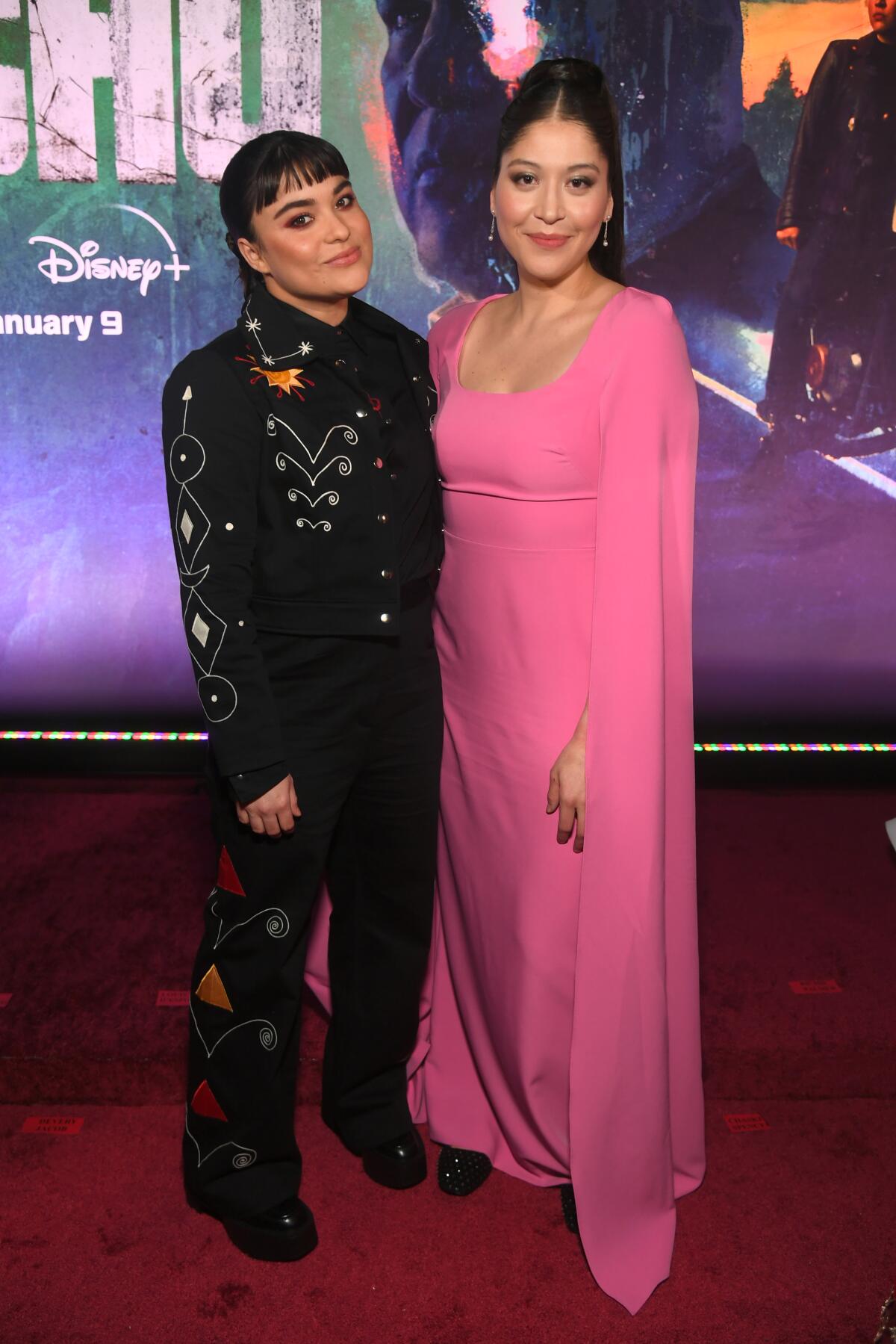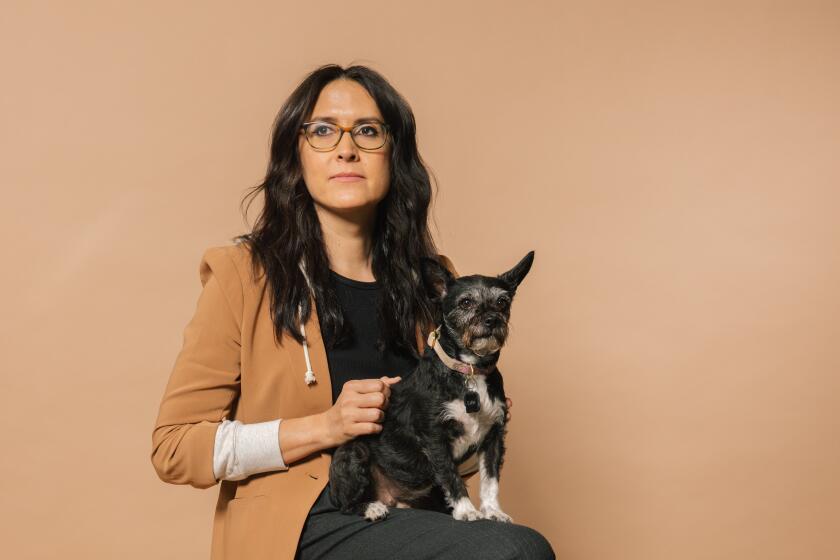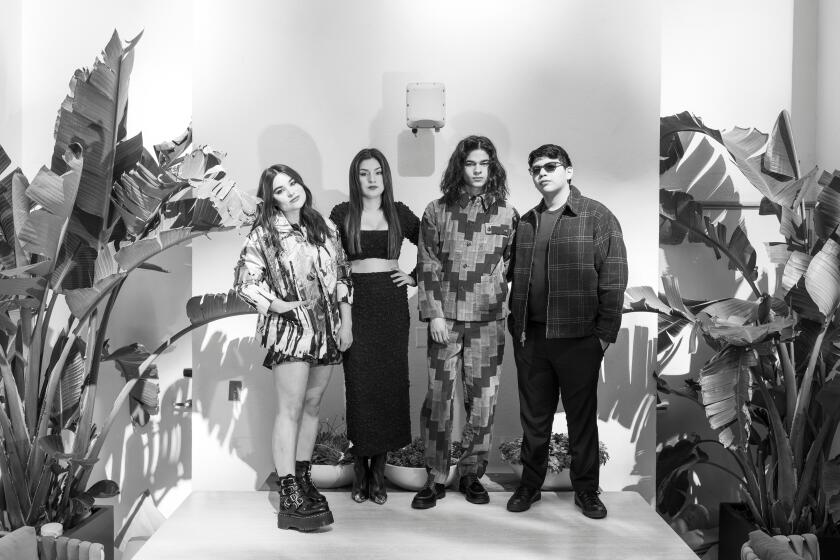Devery Jacobs defends Marvel’s Native American characters against criticism. The critic responds

- Share via
Native American actor Devery Jacobs spoke out this week against a critic who questioned whether two Indigenous characters should exist in the Marvel Cinematic Universe at the same time because they are too similar and “repetitive.” In turn, the critic tried to explain what she meant.
Jacobs, who is Mohawk and also stars in groundbreaking comedy “Reservation Dogs,” has played several Native American characters for Marvel. First she starred as the studio’s first Mohawk hero, Kahhori, in Season 2 of the animated series “What If...?” In Marvel’s latest live-action series, “Echo,” she plays Bonnie, the cousin of its title character, who is an antihero from the Choctaw tribe played by Menominee actor Alaqua Cox.
Recent criticism of “Echo,” which started streaming Tuesday on Disney+, came from YouTube movie critic Grace Randolph, who runs the popular channel Beyond the Trailer. She has long been a critic of the strategies Marvel Studios has used to add diverse characters to its universe. But in statements sent to The Times, Randolph clarified that she meant to add to the conversation around diversity, not detract from it.
Marvel’s “Echo” is Sydney Freeland’s biggest project to date, giving her the opportunity to marry her Native American culture with her love of comic books: “It was both terrifying and exciting.”
During a series of videos reviewing “Echo,” Randolph questioned Marvel’s decision to introduce Jacobs’ character, Kahhori, in late December, less than a month before the launch of Cox’s character, Echo. In a December video she called the two characters “repetitive” because both are of Native American descent and have similar powers. While praising Jacobs’ and Cox’s performances in a separate video on Wednesday, Randolph doubled down on her remarks and said Marvel was “undercutting both these characters” by introducing them so close together.
Earlier this week, when asked about the criticism in an interview with the Hollywood Reporter, Jacobs dismissed Randolph’s take as a double standard, arguing that white actors would never be asked the same question.
“Would somebody go up to a white guy and say, ‘This is the one perspective for a white story that is out there’? Would somebody go and say that?” Jacobs told THR. “That’s egregious, that’s insane that anybody would say that.”
She continued: “I don’t even know if it’s justifiable for an answer, but I’ll give one anyway. I think that the story of Kahhori in ‘What If …?’ is astronomically different from that of Maya Lopez in ‘Echo.’”
Jacobs explained that her character Kahhori’s narrative “is talking about colonization and history and features Mohawk cultures and communities — the community that I come from,” and that Echo is more of “an antihero, kind of a villain, who is coming back to her Choctaw Nation and to her family, and it’s really a dark crime noir family drama.”
“And so, they’re both individual stories that absolutely deserve to be told,” she added.
Just as Hollywood is discovering the young Indigenous stars, they’re finding it’s possible for a TV production to embrace both industry and community.
In text messages sent to The Times, Randolph said her words were “twisted” over social media and during the THR interview in a way that “did not convey my positivity for the characters, including [Jacobs’] powerhouse performance.”
“These stories absolutely deserve to be told, and it’s important to do so,” Randolph said before adding that in her videos, she was “simply having a discussion about how to have the most successful representation in the MCU — which I’d love to see.”
She went on to continue pointing out similarities between Kahhori and Echo, such as a mythical pool of water featured in the first episode of “Echo” and a similar pool in “What If...?” But she acknowledged that “these details pale in comparison to the importance of telling these stories. I very much hope both characters continue.”
In an earlier November video, she decried the “Echo” rollout as a part of Marvel President Kevin Feige’s “misguided attempt to diversify the MCU.” She called it “a good goal” but said Feige went “about it in the worst way possible” and caused “insurmountable harm to the brand.” In another video, she decried recent Marvel releases as being too “female-centric” and said there was a “sameness” to them.
Less than a week after appearing in ‘Obi-Wan Kenobi,’ actor Moses Ingram and the ‘Star Wars’ franchise are shutting down a flurry of hateful messages.
Randolph’s criticism fits within a subculture of comic book, sci-fi and fantasy fans who have scrutinized Hollywood studios’ attempts to diversify fictional worlds that have traditionally featured mostly white lead characters.
Outside the MCU, John Boyega, who is Black, and Kelly Marie Tran, who is Vietnamese American, weathered racist online attacks from fans who were displeased with their casting in recent “Star Wars” films. Moses Ingram faced similar vitriol for her role in “Obi-Wan Kenobi.” For her turn as Disney princess Ariel in “The Little Mermaid” remake, Halle Bailey has received racist hate from fans. “The Lord of the Rings: The Rings of Power” got similar backlash for casting actors of color as inhabitants of a typically white Middle-earth.
Though Randolph’s comments don’t call overtly for exclusion of actors of color, as some members of the “Star Wars” fan base did, Boyega, Tran and now Jacobs all have pointed out how such comments could inadvertently cause a narrowing of opportunities in a Hollywood industry that already undervalues nonwhite leads.
Jacobs also made headlines for her criticisms around diversity and representation in Martin Scorsese’s acclaimed film “Killers of the Flower Moon,” which recounts the murders of the Osage people in the early 1900s by white settlers. While Jacobs praised the performance of Lily Gladstone and other Indigenous actors, she commented in a series of tweets, “If you look proportionally, each of the Osage characters felt painfully underwritten, while the white men were given way more courtesy and depth.”
She further blasted the movie for its portrayal of the murders of Native people, which she decried as not having “honor and dignity,” and said that “showing more murdered Native women on screen, it normalizes the violence committed against us and further dehumanizes our people.”
More to Read
The complete guide to home viewing
Get Screen Gab for everything about the TV shows and streaming movies everyone’s talking about.
You may occasionally receive promotional content from the Los Angeles Times.










